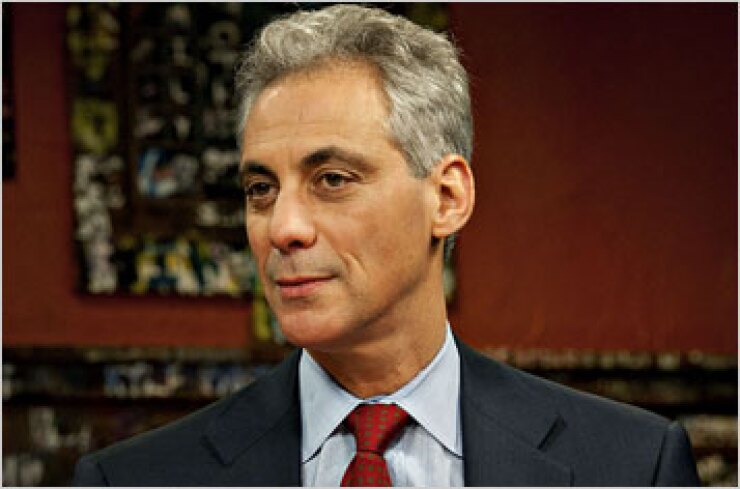
CHICAGO – Chicago is stepping up a long-stalled effort to establish an express rail service from downtown Chicago to O'Hare International Airport, Mayor Rahm Emanuel said in a speech promoting the city's investments in infrastructure.
"If London, Hong Kong, Tokyo, and Toronto can offer this service, the city of Chicago can and must offer it too," Emanuel said in the address Thursday billed as an update to his "Building a New Chicago" speech in March 2012.
"We have been hearing from potential investors and companies around the world about their interest in this project. And our engineers have made progress in identifying the routes to move it forward," he added.
Emanuel set a three-year goal to begin the project and announced the city has hired Bob Rivkin, former general counsel at the U.S. Department of Transportation, to "provide legal expertise in identifying a clear path forward and working with potential partners."
Engineering firm WSP Parsons Brinckerhoff has been examining routes for the service that has long been a goal of Emanuel and his predecessor Richard M. Daley, though neither made much headway.
The city did not offer any details on how the project would be financed, such as whether it would receive public funds or involve a public-private partnership.
Chicago already has subway service to O'Hare via the Chicago Transit Authority Blue Line.
The speech highlighted projects completed in recent years, those underway, and ones in the works. No dollar figure was attached as in 2012, when Emanuel touted $7.3 billion in planned investments that were expected to create 30,000 jobs. Many of the projects had already been announced by Daley, who did not seek re-election in the 2011 race won by Emanuel.
On Thursday, he claimed that the investments over the last five years had created 60,000 jobs with 40,000 more expected from future projects and billed them as instrumental in landing a string of major corporations including McDonald's, ADM, Motorola, GE Transportation, GE Health, ConAgara, Kraft Heinz, GoGo, Coeurs Mining and Duracell.
"When we invest in a new Chicago, economic development follows. When we invest in the transportation system of a new Chicago we create new jobs that cannot be offshored or outsourced," he said.
Since 2011, more than 40 CTA stations have been rebuilt or received major renovations representing more than 30% of the CTA system and four of seven light-rail lines are undergoing upgrades. By 2019 all buses will have been upgraded. A universal 4G wireless network was established in the subway system. Emanuel also announced earlier in the day a new station project for the existing Green Line.
At O'Hare, Emanuel highlighted the opening of two new runways under the longstanding O'Hare Modernization Program and touted that 16 passenger carriers had launched international routes.
Ahead, the CTA will break ground next year on the renovation of its Red and Purple lines and new gates will be added to O'Hare and one of its terminals overhauled. The Chicago Infrastructure Trust earlier this week selected a lead company to handle the conversion of the 270,000 streetlights to LED in what's been billed as the nation's largest project of its kind.
Chicago and its sister agencies have funded much of the upgrades from a mix of borrowing, user fees, private investments, and increasingly from federal funds that have extended beyond traditional transit and airport grants to include Transportation Infrastructure Finance and Innovation Act loans.
The city won TIFIA loans for its Chicago River Riverwalk makeover and its new consolidated rental car and parking facility at O'Hare. The CTA has TIFIA loans for railcars and a rail line overhaul.
Chicago is working with federal officials to obtain a low-interest loan of up to $1 billion to finance redevelopment of the city's historic Union Station rail depot. The city and federal officials recently announced an Emerging Projects Agreement with the goal of obtaining a loan from the Railroad Rehabilitation and Improvement Financing program.
Recently awarded federal Core Capacity grants totaling $1.1 billion will help fund the CTA $2.1 billion Red/Purple Modernization project – also cited by Emanuel.
The investments have not reversed the city's rising age of property, plant and equipment, according to data provided by Richard Ciccarone, president of Merritt Research Services.
Ciccarone said investments in both nuts-and-bolts infrastructure and projects that pack a big image punch like an express rail line are important to the city's economy and its ability to keep and attract both residents and businesses.
"The impression is that it makes a difference to have infrastructure that is attractive to businesses," Ciccarone said. Images of congested highways don't help but a project like the express service "provides an impression that Chicago is a place that's easy to do business in."
The city's average age of property, plant and equipment rose annually from 2010, with the exception of a drop in 2012. In 2010, it was 12.5 years and in 2015 it was 17.4 years. That covers roads, bridges, and streetlamps and city buildings and doesn't reflect the sister agencies like the CTA and Chicago Park District and enterprise systems like water and sewer and the airports.
The figure compares to the median for 1,612 cities of 15.1 in 2015, up from 12.9 in 2010. Chicago's has worsened at quicker pace.
"The rising age of Chicago's infrastructure is a hidden liability which reflects a continued inability to keep up with necessary repairs, replacement and expansion," Ciccarone said.
The average age of property, plant and equipment for water and sewer have fared better, with water only slightly worsening to 18.1 years in 2015 from 17.5 years in 2010 and sewer improving to 13.1 from 16.3 years. During Emanuel's tenure water and sewer upgrades with funding from big rate hikes.





